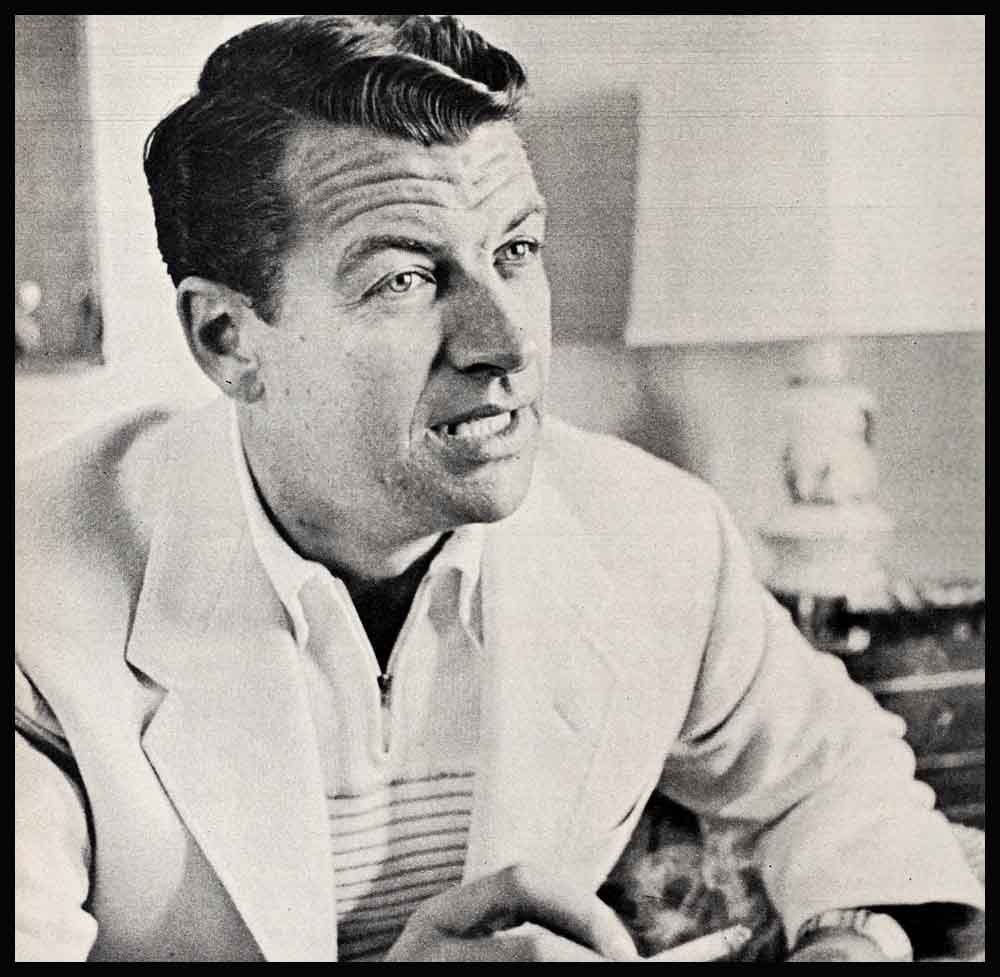
Is College Really Necessary?
Editors frequently ask me for my considered opinion on the virtues of marital bliss, or what are the seven sure-fire means by which a damsel can snare an elusive male. On these and similar topics I am no authority. I’ve neither been married nor snared; therefore, I’m completely unqualified to give advice.
But, when Photoplay’s Editor asked me to express my thoughts on “Is College Really Necessary?” I was delighted, because I do have some knowledge and opinions about this subject. You see, I was graduated from the University of San Francisco in 1942 with an A.B. degree in speech and drama. I also spent three years working for my Master’s Degree in theatre history and dramatic literature at Stanford University.
As for myself, I know the value of a college education.
But for you, who may be a junior or senior in high school, the most important question facing you at the moment may well be, “After high school, what?” College? Junior college, vocational school, on-the-job training, or work?
More than a million boys and girls will graduate from high school this year. Of these, thousands have already made up their minds to go to college and join the some 2,500,000 who are already enrolled. Many in this group are serious, mature students whose character, ideals and aims have led them to the earnest conviction that college leads the way to a happy, useful and prosperous life. College is a steppingstone to the careers they’ve already planned. Others in this group, who are vague on career plans, have decided to go to college to be in the spotlight as great football heroes or because college sounds like fun and their parents can easily afford to send them. They dream of dates, dances, proms, the bull sessions, late-snack parties in the dorm and unlimited freedom away from the watchful eyes of parents.

But there are thousands more who are not sure whether they want to go, need to go, or can afford to go. In this group are those who have no idea of what they’d like to do in the future. Then there are still others—strong-minded little characters who knew as far back as grammar school that they wanted to be engineers, or nurses, or lawyers. For example, my brother Willis, who is a couple of years older than I, knew what he wanted to do with his life by the time he was fourteen. Willis was the leader of our group’s football and baseball games and he could use his fists when he had to. I remember the day he said, “I intend to study for the priesthood.” And he did. Today he is Father Willis Egan, S. J., and is completing his thesis for a Ph. D. at Loyola University in Los Angeles.
In kindergarten, I played John Alden in a Thanksgiving pageant. After the performance, when the teacher told my proud mother that I had a fine voice, that did it! From then on I was a ham. A couple of years later, at Jefferson Grammar School, my teacher, Dorothy Bailly, gave me the part of an American traveling salesman in a little opus called “The Windmills of Holland.” She encouraged my interest in the theatre. I knew then I wanted to go to college and study dramatics. I took all the drama and literature courses at St. Ignatius High School and when, at seventeen, I entered an open oratorical contest with some 15,000 other young hopefuls and won both a trip to Honolulu and a check for $100, I was more than ever convinced that dramatics in some form was to be my future career. To prepare myself, I knew college was necessary.
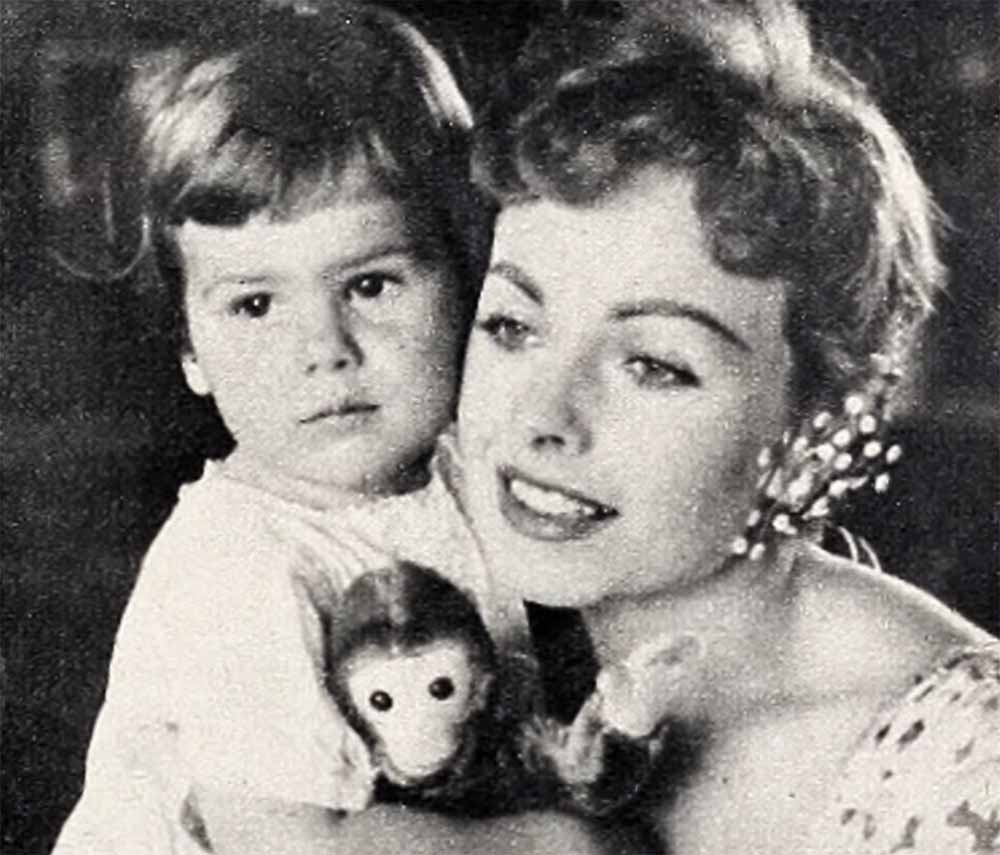
But for you—undecided, still faced with the choice of a future plan for life—I believe the most important question to ask yourself is: Do you want to go to college? Some say no right off. They are the youngsters who are eager for independence, for a salary check, even for marriage. They see little use for high school courses—such as Latin, literature, biology, trigonometry. “How will Shakespeare help me in my job, or Latin help me find a husband?” they ask.
Others are wondering what college has to offer them. In my opinion, college can be one of the most wonderful experiences you’ll ever have. It can change your whole life—broaden your mind, give you self-confidence, teach you self-discipline, give you the tools of learning. And while college is teaching you how to live and to make your life richer and happier and more useful, it can also teach you to make a living. In addition, it can be fun. all this, if you are college material.
It takes all kinds of people to fill a campus. There’s the All-Around Student—good in class, popular and equally interested in extra-curricular activities. Then there are the Big Man and Big Woman on Campus—the go-getters and natural-born politicians who feel social contacts are the chief thing to be gained in college. And there are the Greasy Grinds—those who concentrate on getting A-averages and Phi Beta Kappa keys, and are seldom seen outside the classroom or the library.
So college is not just one road but a maze of many. A student can train for one of a number of careers or he can decide to get a general education—the classic ideal of the well-educated individual. Of the liberal arts degree a cynic has said: “It is regrettable, but culture is inedible.” Not all will agree by any means.

But everyone does agree that college costs money. Will it be worth all the struggle, both to you and your parents? Before you decide, it’s a good idea to take stock of yourself. How good a student are you? You don’t have to be a “brain” in order to go to college, but your grades certainly should be average or better. Some colleges won’t accept you unless you rank in the top ten percent or twenty-five percent of your class. Some insist that you pass College Entrance Board examinations.
If you’re vague about a career choice, don’t worry. You’ll most likely find the answer after you get to college. Or, if you are torn between two different careers, college can help you make a choice.
I’ll confess that for a time I did waver a little from the idea of becoming an actor. That was after I’d served four years in the Army and seriously considered studying law. Getting a toehold in Hollywood or on Broadway looked pretty bleak to me. But acting finally won out, because my whole life had been bound up in it for as long as I could remember. Besides, I already had earned my A.B. in drama and speech. So I enrolled at Stanford and began working on my Master’s Degree in theatre arts. For added experience, I attended Northwestern University.
After answering the question of whether you want to go to college, there is another question to ask yourself: Do you need to go to college? This is an age of specialization and, if you wish to advance in almost any field, you’ll need specialized training. Otherwise, you’ll find yourself competing with people who have had the benefit of college training.

In debating the whole subject of higher education, you may begin to wonder: Will a college education pay off? All cultural and spiritual considerations aside, a college diploma does have considerable cash value. This is borne out by statistics which show that, although college graduates come from every type of home and go to every type of college, they have one trait in common: they are conspicuously successful, from a materialistic point of view. They hold the best jobs; they make more money than their non-college friends.
But graduating from college won’t necessarily mean that you can immediately step into a fine, high-paying job. Take my own case, for example. After a pretty extensive education and after appearing in dozens of plays, I thought I was ripe for pictures. But Hollywood didn’t think so. No one in pictures thought so. And for a long bleak period I stuck it out, buoyed up by my own faith and checks from home.
Can you afford to go to college? This is another important consideration—particularly for parents, who may consider it the most challenging of all. There are thousands of gifted youngsters who do not go to college because their parents cannot afford to send them. However, with some help from parents, plus part-time jobs and vacation jobs, these youngsters could have the benefit of a college education. Today, more than half of all men students and approximately one-fourth of all women students are earning either all or part of their expenses for college.
How do the working student’s grades compare with the one who gets his money from home? And, when it comes to salary checks later, which one will be more successful? Statistics show that on both counts—grades and future earnings—the working student is equal to the nonworking student.

But it isn’t easy. You can survive it, and the hard-won triumph will give you considerable satisfaction. The principal objection to working concerns the slow student who must allot many more hours for study than the quick student. If a slow student doesn’t plan his work-load in proportion to his scholastic abilities, he may find himself robbed of the very education he is working so hard to obtain. The second objection is that a working student must cut down on his extra-curricular activities. However, this doesn’t mean he must give them up entirely. I’m very fond of all kinds of sports—football, baseball, rowing and tennis. By budgeting my time, I managed to include a fair share of them all through school.
I first learned to work, study and play when I took over my brother’s newspaper route as a youngster. And when I was getting my A.B., I worked as a movie usher and as an office worker and laborer in the shipyard. I also worked during vacations. While I was getting my Master’s Degree I taught public speaking at San Francisco University. Looking back today, I don’t think I missed much of college life by working.
When you consider that four years of college may cost anywhere from $4,000 to $10,000 depending on the school chosen, it may cause you—and particularly your parents—to pause and wonder. No doubt you’ll have to give up a great deal to get that college education. But you will not regret it.
However, one word of warning. Accept aid from your family or save enough from your summer job to see you through your first semester at college. Do not try to work during your first term because, in addition to adjusting to the startling changes from high school—new people and new surroundings, more intensive studies—employment can become trying.

Scholarships and college loan funds have helped finance thousands of students through college. You should inquire about them. once you have decided that you can afford a higher education, you are then faced with the problem of selecting the type of school. It may be a struggling little school barely able to afford a new microscope for the Science laboratory, or it may mean a Big Ten university with an enrollment of 30,000. Your choice of a college depends largely on your own personality. Do you want a big puddle to swim in? Then pick a big campus. Are you happier in small, informal groups? Then you’ll enjoy a small college. A school far from home means that you’ll have to stand on your own two feet. It’s a wise idea to build up a list of colleges that appeal to you and then make the final decision with the help of your high school teachers, your parents and friends. Choose several and apply in good time, for colleges are overcrowded and you may have to settle for second or third choice.
Once you are in college, you’ll have to choose between loafing and studying. One bright student told me, “In high school I was warned that I’d have to work hard when I went to college, that the competition would be stiff. College does require a bit more work, but it isn’t nearly as difficult as I thought it was going to be. I learn only enough to get by.”
Should you study hard—or just to coast along with passing grades? Should you or shouldn’t you join in a number of alluring outside activities? Next to choosing a college and a course of study, these are the questions that most bother the beginning student—and they are often a cause of joy or regret in later life. For my part, when I look back over my college years, I’d do it all again—except that I’d have studied harder and taken more varied courses.
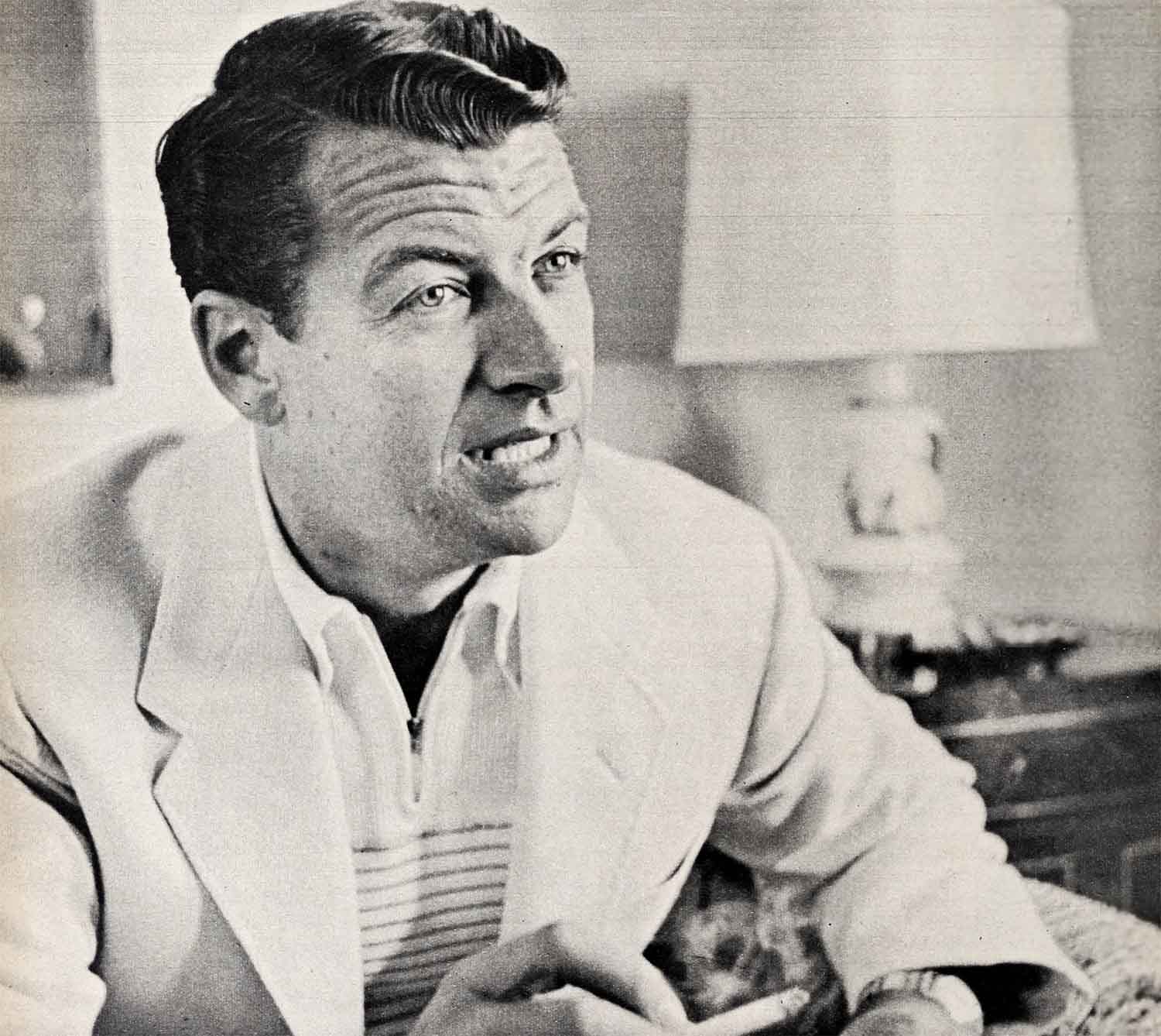
“It takes all kinds of people to fill a campus. The thing is, to know if you belong there—and why”
When I told a friend the other night that I was doing this article he said, “I learned a fair amount in college and had fun. But if only I’d had a better idea of what I was doing when I entered college it would have been so much better. I wish I’d taken some aptitude tests, as high school students get today. My high school teachers didn’t have time to help me; my folks didn’t know anything about it. I just sort of picked my college out of a list and my courses out of a catalog. But it all turned out luckily.”
His wife, and mother of their three youngsters, laughed as she said, “Right now I’d trade History of Civilization for a cooking and nutrition course. Now, as a housewife and mother, I’m certain my education is keeping my interests above the always present dishpan and diaper level and, furthermore, it has stimulated me to study child guidance. I believe that, even if a girl goes from graduation to the altar, as I did, a college education is worthwhile. And particularly, should it ever become necessary for me to rely on my own resources, I’m trained for a profession.”
Maybe, in your particular case, college isn’t the answer. You might be happier taking night extension courses or apprentice on-the-job training.
If you do not want a full four-year education, the junior, two-year college may be a perfect solution. And if you are interested in the fine or applied arts—accounting, agriculture, business, and the like—you can receive concentrated training which will prepare you for a job after you complete your two years. Or you may take liberal arts courses and transfer to a four-year college later. Junior colleges are particularly suitable for those who haven’t chosen a vocation and for those who lack some of the qualifications for college entrance.
Some of the best college students are those who first went to work for a year or so before entering college. For example, a young girl, after finishing high school, gets a job as a receptionist in a doctor’s office. While there she grows interested in the doctor’s laboratory and decides to go to college to get her B.S.
When I was teaching public speaking, there was a goodly number of World War II veterans who filled the classrooms. Most of them were truly interested in learning and worked hard at their studies. Their incentive developed from their out-of-school experience and the added maturity of a couple of years. And college paid off for them.
So—I believe in a college education. However, that doesn’t mean you can’t have a happy and successful life without a higher education. Ilka Chase, well-known novelist and actress, once said at a university alumni dinner: “I’m always happy to be invited to these affairs as I have never been able to get to college except as a speaker.”
But for those who do get to college as students. I believe the best advice is to listen to all advice and then make your own decision. Wise parents help their children find out about college, then let Susie or John take over. Choosing a college, like choosing a mate, should be done by the ones who are going to embark on the adventure.
The great question—Is College Really Necessary?—is really two questions: Do I have what a college wants? And do want what a college has to offer? And, you do decide to go, you’ll find that college education is not an end in itself but a means to a higher end.
THE END
It is a quote. PHOTOPLAY MAGAZINE JULY 1956


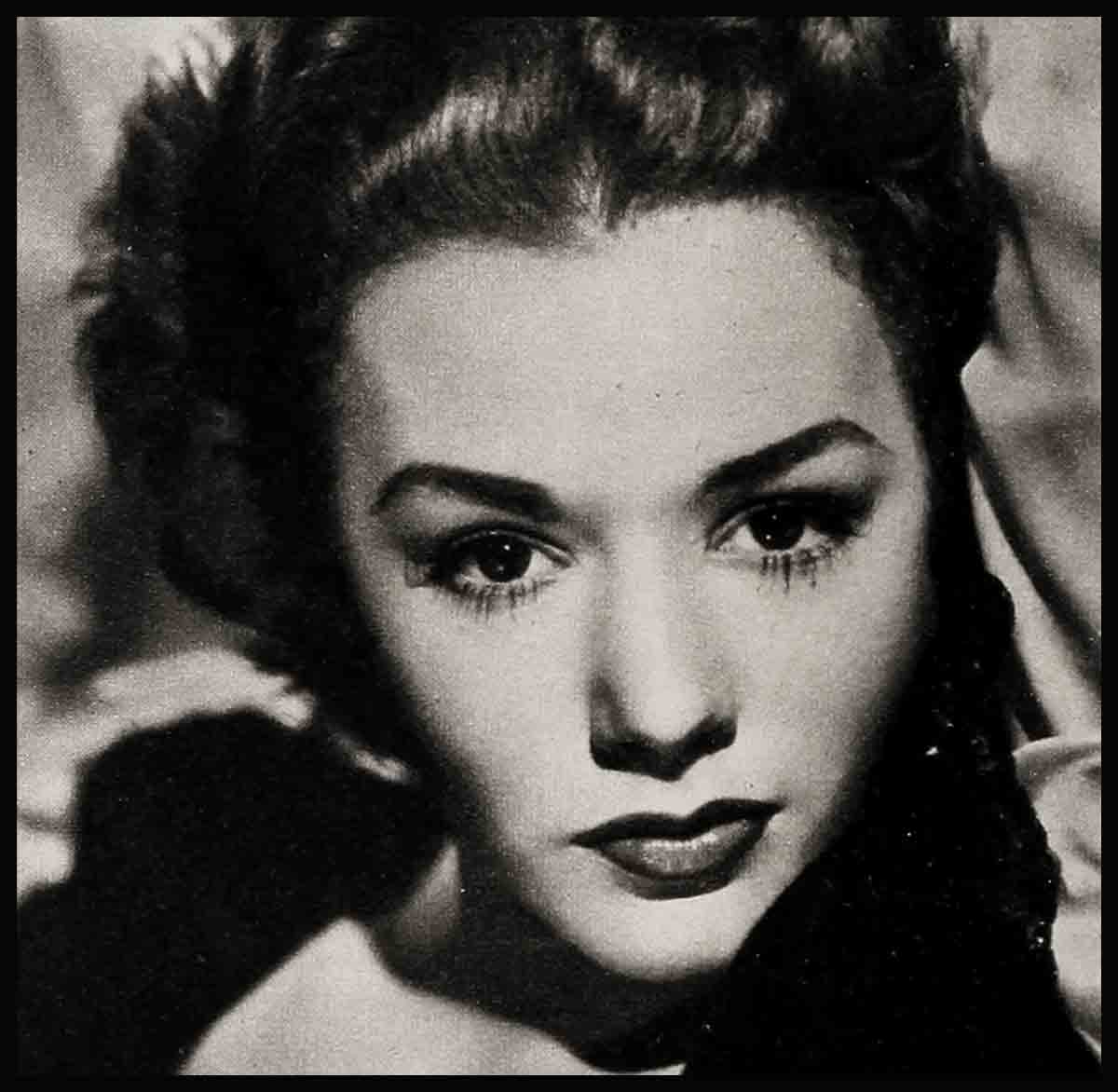
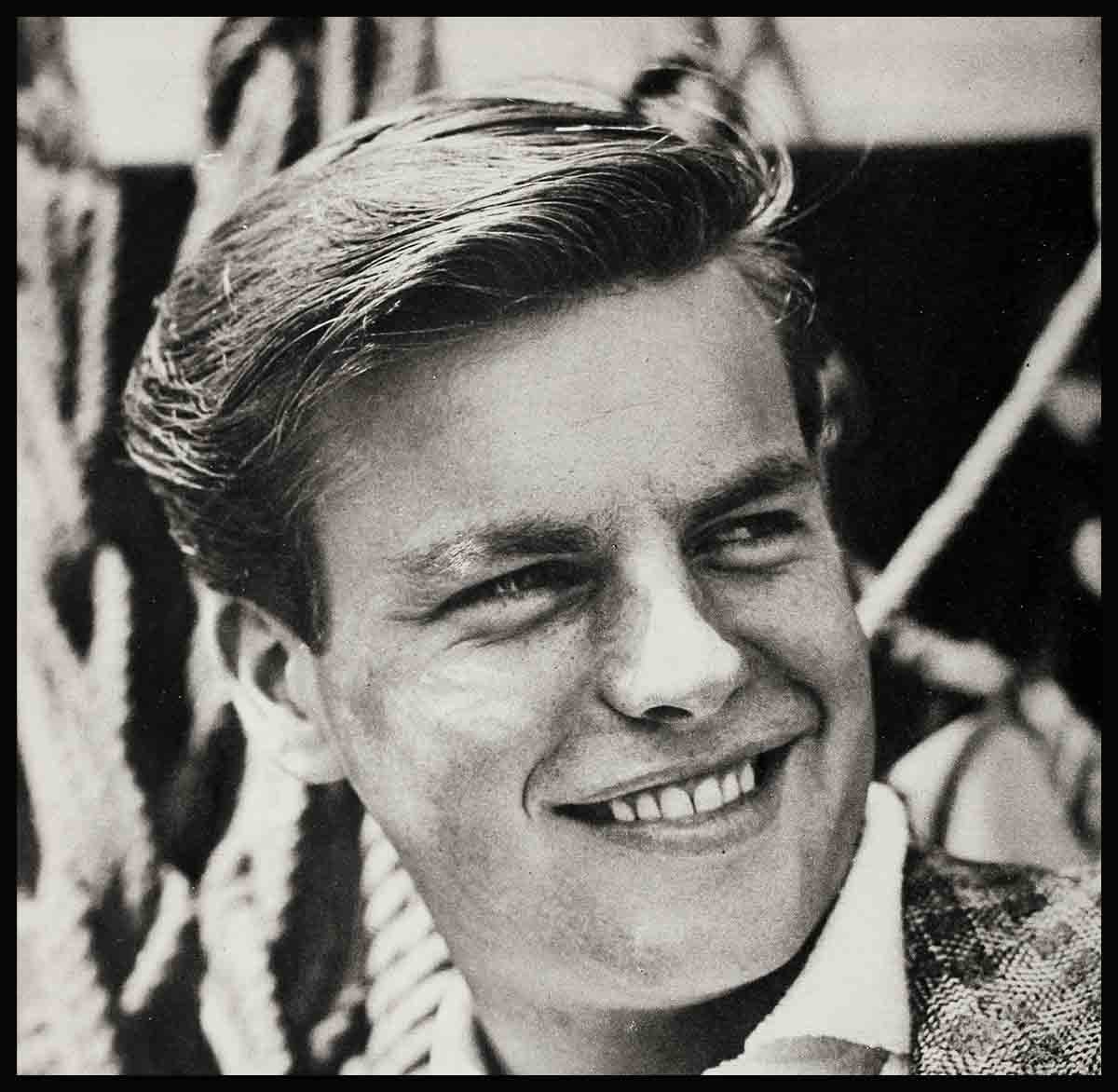
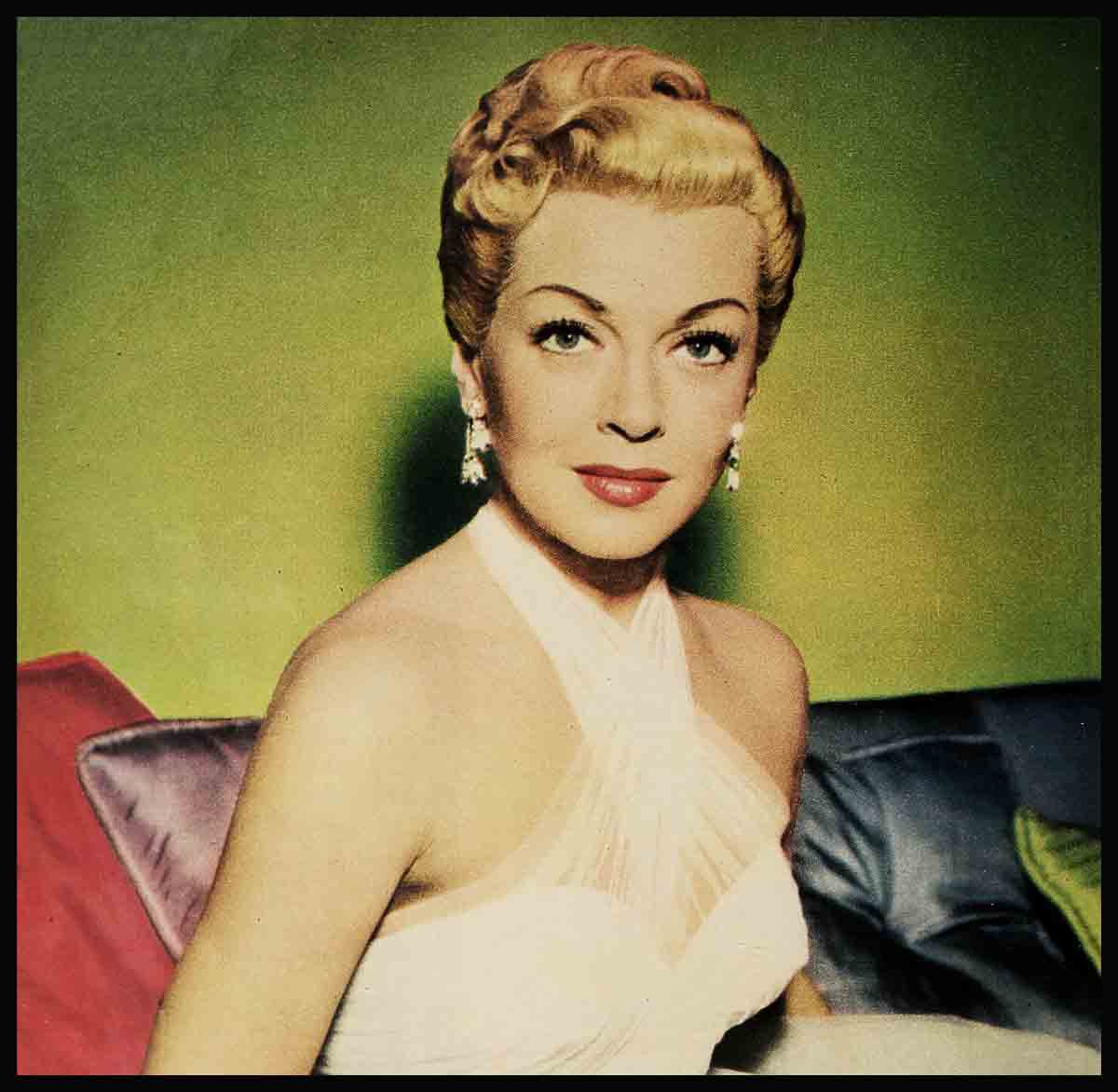
zoritoler imol
22 Nisan 2023I regard something truly special in this site.